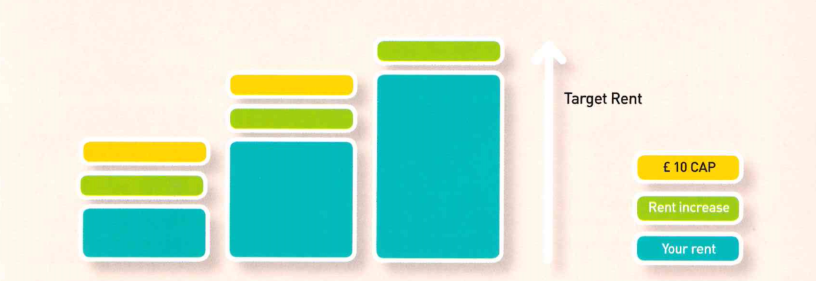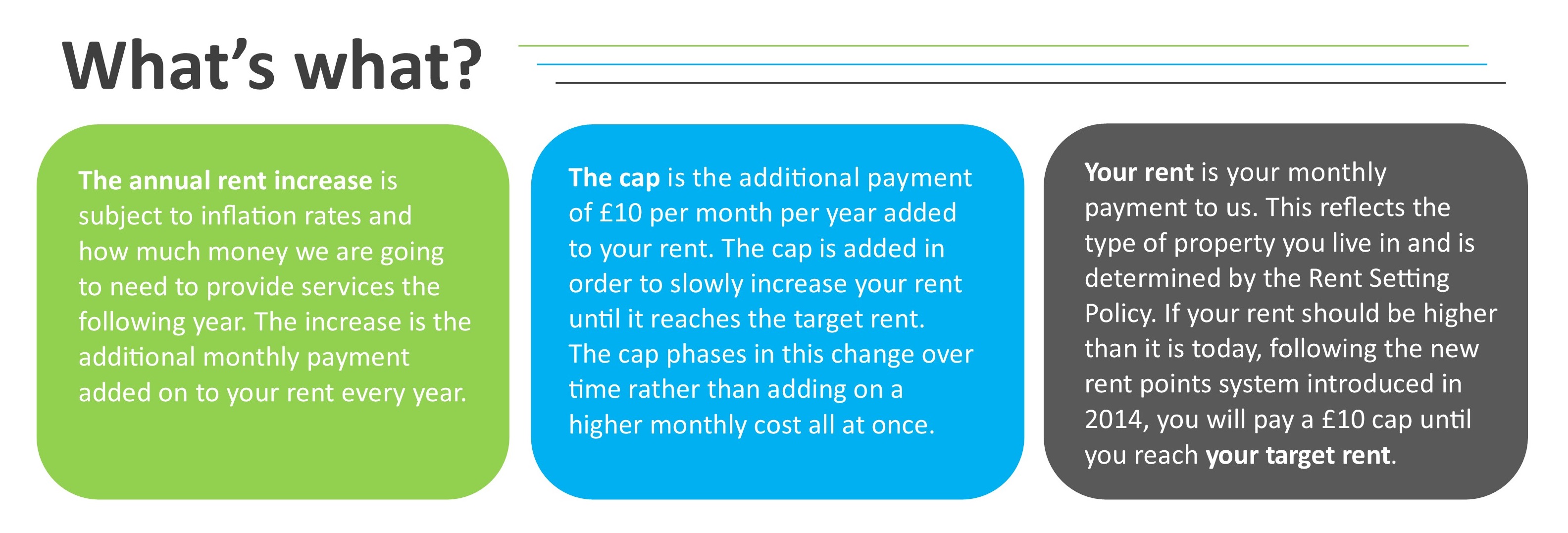What is the CAP?
Every year, your monthly rent is adjusted to take into account a rise in inflation. But on top of this rent increase, some tenants pay a CAP of up to £10 every month.
Find out what the CAP is and why you might be paying it...
Why am I charged a CAP? The short answer is that your rent is lower than the rent we charge other tenants for the same type of property.
This means that... when two tenants pay different rents for the same property type, we need to bring one tenant up to the target rent.
How the CAP works
If your rent is too low, the CAP is added to your monthly payment in order to gradually increase your rent until it reaches target. The CAP phases in this change over a number of years, rather than adding on a higher monthly cost all at once. This is how it works:

Find out more by downloading our leaflet What is the CAP?
How your rent is set
If you're paying a £10 CAP you will be doing so until you reach your target rent. But how do we decide what this target rent should be?
The target rent is determined by our Rent Setting Policy. The policy sets out what we need to consider when deciding how much to charge for all our different properties and ensures that:
- we receive enough income from rents to allow us to continue to look after and maintain your property.
- we have money to allow us to carry out planned improvements and repairs.
- we are able to build and develop new properties.
- our rents are affordable and comparable with the rents of other local social landlords.
If you were a tenant with us in 2014, you may remember being consulted regarding a new Rent Setting Policy. As a result of this consultation some rents were increased and a new rent structure was introduced.
What you said in 2014
When we consulted with tenants in 2014, 85% agreed that similar properties should have similar rents. This means that most tenants felt that properties of the same size and type should have equal rents. But it was accepted that, while two tenants might live in a two bedroom terraced house, one may have more amenities than the other - such as a garden, or a parking space.
Tenants were asked to consider these extra amenities such as a garden, a garage, a driveway, a private entrance - and how this would affect rents.
Tenants in properties with more bedrooms should pay more than those in properties with less bedrooms.
Tenants in more desirable types of property should pay more than those staying in less desirable ones. For example, tenants staying in flats within a common stair should pay less than a tenant staying in a semi-detached or terraced house. Tenants living in a detached house or bungalow is seen as more desirable than a semi-detached or terraced house and therefore those in the more desirable property types should pay more.
Tenants were also asked to consider extra amenities such as a garden, a garage, a driveway and a front and back door. Views on whether rent charges should be different based on these were mixed.
- Energy efficiency was something that tenants felt should be charged more for but only where there was a high energy efficiency rating as their energy costs would be lower than less energy efficient properties. Only the newest houses are the ones likely to achieve the highest rating for which more rent will be charged.
Other factors that were considered but discounted after further discussion included:
- The age of the property. This was debated at length but tenants agreed that this should not be taken into account given that all properties require to comply with the Scottish Housing Quality Standard by 2015 which ensures that everyone has a similar quality of property. This is the major difference with the current rent setting policy which took account of the development date of properties and is the major change in the new policy.
- Being near to amenities such as schools, shops, doctors etc. The tenants agreed that this was quite subjective and as such should not be a factor. For example, a young family may find being near a school highly beneficial but an older or single person may not.
During the consultation, it was agreed that there should be a ‘base rent’ - a rent which all tenants would pay for a property type. In addition to the base rent, any extra amenities would be taken into account to determine the rent charged.
New Rent Structure
The Association’s Board of Management approved the principles of the new rent structure model, incorporating the views from the tenant consultation. The structure is based on rent points for:
- property size (number of bedrooms )
- the number of bed spaces (i.e. single bedrooms have one bed space while a double has 2 bed spaces)
- property type, for example terraced house, flat – common entry, flat – private entry
- heating type
- amenities, for example curtilage parking, which is a space within your garden to park your car
- energy efficiency
The points are then given a monetary value and added to the base rent, in order to arrive at the individual rent for each property. For a full list of rent points, see page 5 and 6 of our Rent Setting Policy.
In addition to your rent, you might also be paying service charges. Service charges are the costs for recurring services that are not covered within your rent. If you live in a block of flats, for instance, these can include regular stair cleaning and/or the cost of stair lighting.
Implementation of the CAP
After consideration of feedback from all tenants who responded to the 2014 consultation we phase in the changes over time with a CAP on the increases for tenants whose properties will result in a higher rent charge. Other properties will have their rents frozen until they reach their target rent.
The CAP is not the same thing as the annual rent increase.
Each year, the Association’s Board of Management will commence the process of considering our budget and the level of rent increase needed for next year. The annual Rent Review is when we consult with tenants on whether you think rents should go up - and by how much - for the forthcoming financial year. The Rent Review will take inflationary costs into account - but it needs to strike a balance between two key factors. On the one hand, we need income to provide services to a satisfactory standard. On the other hand, we have a duty to keep rents affordable.
Over the next few years while we implement and phase in the new rent structure we will still need to raise sufficient income to maintain our services to you. For a number of tenants this will mean an above inflationary increase. However we will CAP any increase so that no one will pay more than the annual increase applied plus a maximum of £10 per month until all tenants are on the target rent.
Consideration will be given to any views submitted by you. So if you have any feedback on the rent increase it is vital that you respond to the tenant survey included with the Rent Review.
The annual rent increase and the £10 cap are both added to your monthly rent.
Example...
| Current rent | New Rent |
| £342.06 | £342.06 Previous |
| £11.29 inflation increase | |
| £10 CAP | |
| £363.35 Total new Rent |
Service charges are the costs for recurring services that are not covered within your rent. If you live in a block of flats, for instance, these can include regular stair cleaning and/or the cost of stair lighting. Where applicable these costs will be shown separately on your rent notice so that you can see what you are being charged and what the service covers.
The level of the charge is set to cover the cost of this service and a small charge to cover the Association’s administration costs. Any proposed increase will reflect the costs actually incurred.
If you have any questions about the cap or wish to discuss how it affects your monthly payments, we would be happy to talk to you. Give us a call on 01506 439 291
find out more
Download our leaflet What is the CAP?
ask us
If you have any questions about the cap or wish to discuss how it affects your monthly payments, we would be happy to talk to you. Give us a call on 01506 439 291

